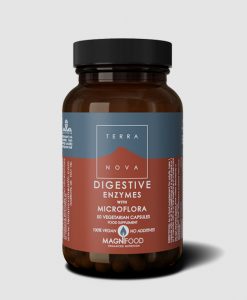Nutritional Therapist, Alice Bradshaw, guides us through how to ease symptoms of irritable bowel syndrome.
Bloating, excess gas, heartburn, constipation, stomach pain – these symptoms are becoming constant companions for an alarmingly increasing number of individuals. While the interest in gut health continues to grow, so does the number of people who feel that something is just not right with their digestive systems. It is perfectly normal of course, to feel a bit bloated and gassy after a particularly lavish meal (maybe accompanied by a rich dessert and alcohol), but many people are living with debilitating gastrointestinal problems that limit the quality of their lives.
Any new or ongoing changes in digestive health should be assessed by a healthcare professional. Typically, if upon examination and testing, no serious anomalies are found, the given diagnosis is usually irritable bowel syndrome (IBS).
IBS is an umbrella term that describes a pattern of symptoms including altered bowel habits, abdominal pain, excess gas, reflux and bloating. However, because the heath of the digestive tract governs the health of the whole body, systemic health problems such as brain fog, sinus infections, mood disorders and many more, can be attributed to imbalances within the gut.
Personalise your nutrition
The plethora of self-help information for the IBS sufferer may be both a blessing and a curse. A Google search for IBS will result in literally thousands of suggestions, ranging from special diets, supplements, herbs, prebiotics, probiotics, fibre, fermented foods, enzymes, fasting, bone broth – and many, many more.
While most or perhaps all of these interventions may play a role in aiding gut health, there’s often no guidance on how to sequence these tools into a meaningful protocol – hence many people give up after randomly trying several so-called solutions.
Rather than taking a scatter gun approach to managing gut health, adopting a personalised approach will invariably offer better relief and symptom management. This is due to the fact that IBS causes and triggers do vary from person to person. A round or two of antibiotics can disrupt the delicate balance within the microflora (the beneficial bacteria residing in the intestines). Similarly, too many bacteria in the wrong part of the intestines may be a trigger for symptoms. Low stomach acid or a lack of digestive enzymes will result in poor digestion, as will stress, poor dietary choices, excess alcohol and even a lack of sleep.
The first step to take is to assess your diet and lifestyle to see if there are any obvious triggers to poor gut health. Keeping a food diary which records food intake and correlating symptoms can give a useful insight as to whether or not dietary patterns are contributing to symptoms. Do wheat, gluten or dairy products feature in every meal? Do you drink juices or carbonated beverages? Do you snack constantly or leave large gaps between meals? Do you grab a sandwich at lunchtime while continuing to work at your office desk? Do you eat dinner late at night or snack just before bedtime – or even in bed? All these habits stress the digestive system and may contribute to symptoms as much as or even more than the actual food choices that you are making.
Facts about FODMAPs
While there are many diets purported to relief IBS symptoms, the low *FODMAPs diet is backed by clinical research and has a good reputation for offering real relief. FODMAPs are fermentable sugars/carbohydrates found in a wide range of foods (many of which are healthy foods). For some individuals with an imbalance in their gut bacteria and/or too much bacteria in the small intestine, these FODMAPs-containing foods are rapidly fermented by the bacteria, resulting in bloating, gas, distention and altered bowel movements. Many experts are now exploring the link between dysbiosis (a disturbed balance of gut bacteria), high FODMAPs intake and gastrointestinal reflux disease (GERD), histamine intolerance and inflammatory conditions.
The FODMAPs diet is an elimination diet, rather than a diet intended for long-term use as paradoxically, these fermentable carbohydrates are crucial to healthy gut function in the long-term. Additionally, sensitivity to FODMAPs is very individual so a person may or may not react to many of these foods. Typically, the foods that cause most symptoms are wheat-based foods, garlic, onions, apples, and pears. To prevent nutritional imbalances and deficiencies, the low FODMAPs elimination diet should only be undertaken with the guidance of a trained nutritional practitioner.
Supplements to support
While there are literally hundreds of digestive health supplements available now, perhaps the most fundamental supplements to initially consider are beneficial bacteria (aka probiotics or microflora) digestive enzymes and the many herbs and spices that offer gentle, yet effective digestive support.
- Probiotics are live micro-organisms that help to restore and repopulate the gut with the beneficial bacteria that are naturally found there. Food sources include yogurt and other fermented foods. Supplements providing microflora (probiotics) containing both Lactobacilli and Bifidobacteria can significantly benefit the environment of both the small and large intestine. The gut microbiome needs to be in a state of balance for good health and a lack of beneficial bacteria can exacerbate an overgrowth of yeast or detrimental species of bacteria.
- Prebiotics, which include inulin, fructooligisaccharide (FOS) and larch tree arabinoglalactans are a special category of dietary fibre, which support the growth of beneficial bacteria within the gastrointestinal environment. After consuming prebiotics, gut bacteria produce short chain fatty acids – compounds known to support gut integrity. Food sources of prebiotics include onions, cocoa and garlic, so you won’t be including large amounts of these foods if you are on a low FODMAPs diet. Research suggests that many IBS sufferers do benefit from the small amounts of prebiotics that are found in supplements, although it is possible to experience some bloating initially. It’s commonly recommended to see how you respond as an individual to these interventions.
- Many gut-related symptoms and disorders are associated with digestive enzyme deficiencies or imbalances therefore digestive enzyme supplements are often essential tools in dealing with such problems. Any number of food components can trigger symptoms, so the best results are likely to be achieved with broad-spectrum products providing a wide variety of enzymes. Supplemental digestive enzymes typically provide a range of macro-nutrient digesting enzymes including amylase, protease and lipase. They may also contain lactase for those who struggle to digest with dairy products and alpha galactosidase, which specifically targets the difficult to digest carbohydrates that beans and pulses contain.
- Herbs and spices are often overlooked for their health-giving properties. They are hugely beneficial to many aspects of health and numerous botanicals are specifically supportive to digestive health. Ginger root is perhaps the most well-known digestion-supporting spice. Studies have shown that it can help to soothe the intestinal tract, reduce spasms, expel excess gas, relieve nausea and encourage gut motility (peristalsis). Fennel bulb and its seeds are great to include at mealtimes for their digestive properties, which include reducing intestinal gas, bloating and cramping. Cardamom is a highly pungent and aromatic spice and has been used since ancient times as a digestive tonic. It is thought to soothe the digestive tract and help to expel excess gas from the intestines.
- The mineral magnesium is proven to be a gentle, yet effective support for those who struggle with poor motility or constipation. It is thought that it helps to draw water into the colon to hydrate and soften the contents, while encouraging gentle peristaltic action of the intestinal wall. Many people who have tried dietary changes, laxative medications etc., to no avail, experience gentle relief when adding a daily magnesium supplement.
There is a wealth of resources, dietary interventions and natural supplements that can be used to manage gastrointestinal health issues and IBS. Always start with the foundational behaviours that support digestive health, such as hydration, proper chewing, stress management, movement and sleep hygiene. An interesting theory relating to gut function, known as the polyvagal theory, suggests that supporting and balancing the nervous system (via stress/emotion management techniques) may be crucial to optimising digestive health. There are lots of available resources to refer to, if this is something that you feel may be of interest.
Working with a natural health practitioner can be helpful if you’re feeling overwhelmed but many simple diet/supplement and lifestyle changes can be tried and very often they are all that are needed to bring the digestive system back into balance.
*FODMAPs are Fermentable Oligosaccharides, Disaccharides, Monosaccharides and Polyols

About the author
Alice Bradshaw is a qualified Nutritional Therapist with a passion for health writing.
She has worked in the natural health industry for 25 years and is Head of Education and Nutrition Information at Terranova Nutrition.

Reader giveaway
Terranova Digestive Enzymes with Microflora combines two of Terranova’s international best-selling products, Digestive Enzyme Complex and Microflora Complex with FOS and more.
The formulation features BioCore Optimum Complete enzyme pre-blend from National Enzyme Company (NEC). The enzymes in this blend not only provide one of the widest varieties of digestive enzymes in one formulation, but also provides enzymes that are stable within a pH range two to eight – greatly enhancing their digestive efficiency. The Magnifood Complex includes both digestive/carminative botanicals and bifidogenic foods to support the activity and function of the enzymes and beneficial bacteria. Fructo-oligosaccharides have also been included for their microflora-enhancing properties.
Natural Lifestyle is offering readers the chance of winning one of 25. Click here to enter.


